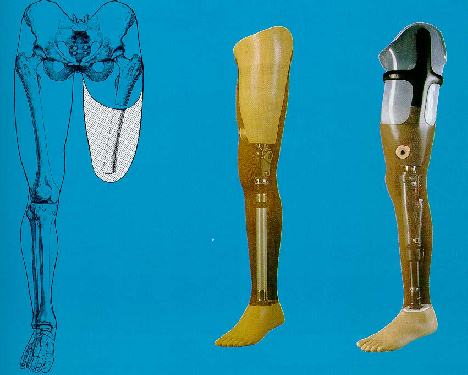Prosthesis - replaces a missing limb or body segment (Orthotic supports a body segment)
Amputations should be considered constructive procedure rather than destructive.
Amputation Levels (for prosthesis fitting): | Optimum | Shortest | Longest |
Transradial (forearm) | junction prox 2/3 & distal 1/3 | 3cm below biceps insertion | 5cm above wrist joint |
Transhumeral | middle third | 4cm below axillary fold | 10cm above olecranon |
Transfemoral | middle third | 8cm below pubic ramus | 15cm above medial joint line of knee |
Transtibial | 8cm for every metre of height | 7.5cm below medial joint line of knee | level at which myoplasty can be done |
Disarticulations
Advantages:
retention of WBing surface
bulbous stump assists prosthetic suspension
Disadvantages:
compromise the choice & siting of joint
bulky appearing prosthesis
Ideal Stump:
Healed, mobile scar
Sensate
Cylindrical or conical shape
Myoplastic procedure
Nerves sectioned under tension
Bone ends bevelled
Elements of a Prosthesis:
1. Socket
transmits forces between the stump & the prosthesis in all planes
may be proximal, distal or total bearing
2. Means of Suspension
suction socket
suspension belts
neoprene sleeve
elastic stocking
silicone sleeve
3. Joint mechanism (knee)
Stance phase control
Simple:
aligns the prosthesis so the ground reaction force passes in front of the knee
locks in hyperextension; 2 drums lock at 0-15deg.
for elderly
Mechanical stabilisers
braking mechanism activated by the WBing load or hydraulics
Swing phase control
Pneumatic cylinder
Hydraulic cylinder
Intelligent prosthesis - computer adjusts rate of swing to cadence (steps/min)
4. Terminal device (hand / foot)
Foot
non-articulated
solid ankle cushoin heel (SACH)
articulated (uniaxial / multi-axial)
energy storing



Tidak ada komentar:
Posting Komentar